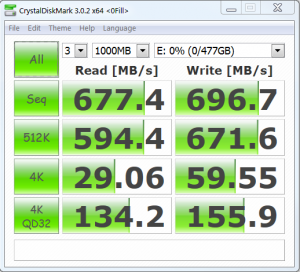CRYSTAL DISK BENCHMARK VER. 3.0 X64
Crystal Disk Benchmark is used to measure read and write performance through sampling of highly compressible data (oFill/1Fill), or random data which is, for the most part, incompressible. In testing the Mach Xtreme MX Express PCIe SSD, we see markedly higher results when testing compressible data samples (left):

 Performance in high sequential testing has seemed to fall just a bit, not including the expected lower write transfer speeds normally seen with LSI SandForce SSDs. This was also the case with the Mushkin Scorpion, although it is much easier to overlook when the SSD is using 4 SF-2281 FSPs and reaching speeds above 1GB/s.
Performance in high sequential testing has seemed to fall just a bit, not including the expected lower write transfer speeds normally seen with LSI SandForce SSDs. This was also the case with the Mushkin Scorpion, although it is much easier to overlook when the SSD is using 4 SF-2281 FSPs and reaching speeds above 1GB/s.
Up until recently, AS SSD was the only benchmark created specifically for SSD testing and it uses incompressible data. AS SSD, for the most part, gives us the ‘worst case scenario’ in SSD transfer speeds because of its use of incompressible data and many enthusiasts like to AS SSD for their needs. Transfer speeds are displayed on the left with IOPS results on the right.

 Although better write performance is seen here through the testing of highly incompressible data, our first glimpse at IOPS leaves things at about half of the listed specifications of 100K. Considering typical notebook SSDs now reach above 100K IOPS, this has a visible effect on the Total Score which is actually lower than many notebook SSDs.
Although better write performance is seen here through the testing of highly incompressible data, our first glimpse at IOPS leaves things at about half of the listed specifications of 100K. Considering typical notebook SSDs now reach above 100K IOPS, this has a visible effect on the Total Score which is actually lower than many notebook SSDs.
Although the Program transfer speed and time is a bit low, that of the ISO definitely starts to show off this PCIe SSD and both the ISO and Game results are decent.
ANVIL STORAGE UTILITIES PROFESSIONAL (BETA)
You may not see this for long (and it’s definitely not common) but you get a freebee simply for reading! Over the last little while, we have been assisting with beta testing new benchmark software called Anvil Storage Utilities which is an absolutely amazing SSD benchmarking utility. Not only does it have a preset SSD benchmark, but also, it has included such things as endurance testing and threaded I/O read, write and mixed tests, all of which are very simple to understand and use in our benchmark testing.
COMPRESSIBLE DATA SAMPLE
INCOMPRESSIBLE DATA SAMPLE
The SSD Review uses benchmark software called PCMark Vantage x64 HDD Suite to create testing scenarios that might be used in the typical user experience. There are eight tests in all and the tests performed record the speed of data movement in MB/s to which they are then given a numerical score after all of the tests are complete. The simulations are as follows:
- Windows Defender In Use
- Streaming Data from storage in games such as Alan Wake which allows for massive worlds and riveting non-stop action
- Importing digital photos into Windows Photo Gallery
- Starting the Vista Operating System
- Home Video editing with Movie Maker which can be very time consuming
- Media Center which can handle video recording, time shifting and streaming from Windows media center to an extender such as XBox
- Cataloging a music library
- Starting applications
MACH XTREME MX EXPRESS PCIE SSD PCMARK VANTAGE RESULTS
Sub-standard PCMark Vantage scoring is typical with the newer ‘driverless’ PCIe cards and we have observed this with both our KingSpec (69472) and Mushkin Scorpion testing (34056) previously. The Total Score achieved by the Mach Xtreme MX Express was 48574 points with particular strength in video editing where high transfer speeds of 417MB/s were reached. These scores are below that of typical notebook SSDs today.
 The SSD Review The Worlds Dedicated SSD Education and Review Resource |
The SSD Review The Worlds Dedicated SSD Education and Review Resource | 
Can’t wait til someone finally uses a pair of Marvell controllers raided with an LSI raid controller and 1GB of DDR3 ram. I like the idea of a PCIe with, let’s say, 2 Sandisk Extreme II 120’s raided with a good controller and a gig of fast ram. And to be honest, I don’t really care if it’s driverless PNP or not. Since I (and most others imo) don’t do much rebooting and don’t mind a longer boot time in exchange for blazing permormance.